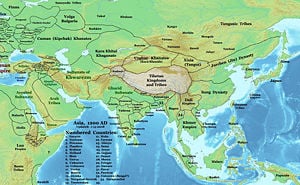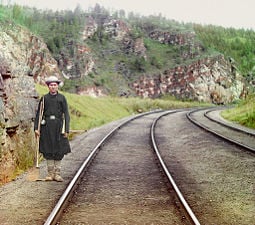Bashkirs
Bold text
| Bashkirs (Башҡорттар) |
|---|
| Total population |
| 1,800,000 (estimated) |
| Regions with significant populations |
| Russia: 1,673,389 (2002)[1] Uzbekistan: |
| Languages |
| Bashkir, Russian, Tatar |
| Religions |
| Predominantly Sunni Islam |
| Related ethnic groups |
| Other Turkic peoples |
The Bashkirs, a Turkic people, live in Russia, mostly in the republic of Bashkortostan. A significant number of Bashkirs also live in the republic of Tatarstan, as well as in Perm Krai and Chelyabinsk, Orenburg, Kurgan, Sverdlovsk, Samara, and Saratov Oblasts of Russia.
Overview
Bashkirs are concentrated on the slopes and confines of the southern Ural Mountains and the neighboring plains. They speak the Kypchak-based Bashkir language, a close relative of the Tatar language. Most Bashkirs also speak Russian: some as as a second language, and some as their first language, regarding Bashkir as a language spoken by their grandparents.
History
The name Bashkir is recorded for the first time at the beginning of the 10th century in the writings of the Arab writer, ibn Fadlan, who, in describing his travels among the Volga Bulgarians, mentions the Bashkirs as a warlike and idolatrous race. According to ibn Fadlan, the Bashkirs worshipped phallic idols. At that time, Bashkirs lived as nomadic cattle breeders. Until the 13th century they occupied the territories between Volga and Kama Rivers and the Urals.
European sources first mention the Bashkirs in the works of Joannes de Plano Carpini and William of Rubruquis. These travellers, who fell in with Bashkir tribes in the upper parts of the Ural River, called them Pascatir, and asserted that they spoke the same language as the Hungarians.
Until the arrival of the Mongols in the middle of the 13th century, the Bashkirs formed a strong and independent people, troublesome to their neighbors: the Volga Bulgarians and the Petchenegs, but by the time of the downfall of the Khanate of Kazan in 1552 they had become a weak state. In 1556 they voluntarily recognized the supremacy of Russia, which in consequence founded the city of Ufa in 1574 to defend them from the Kyrgyz, and subjected the Bashkirs to a fur-tax.
In 1676, the Bashkirs rebelled under a leader named Seit, and the Russians had great difficulties in pacifying them. Bashkiria rose again in 1707, under Aldar and Kûsyom, on account of ill-treatment by the Russian officials. The third and last insurrection occurred in 1735, at the time of the foundation of Orenburg, and it lasted for six years.
In 1774 Bashkiria supported Pugachev's rebellion. Bashkir troops fought under the Bashkir noble Salawat Yulayev, but suffered defeat.
In 1786, the Bashkirs achieved tax-free status; and in 1798 Russia formed an irregular Bashkir army from among them. Residual land ownership disputes continued.
Culture
Some Bashkirs traditionally practiced agriculture, cattle-rearing and bee-keeping. The nomadic Bashkirs wandered either the mountains or the steppes, herding cattle.
Bashkir national dishes include a kind of gruel called yûryu, and a cheese named skûrt.
Bashkirs had a reputation as a hospitable but suspicious people, apt to plunder and disinclined to hard work.
Famous Bashkir people
- Salawat Yulayev
- Zeki Velidi Togan
- Murtaza Rakhimov
- Elbrus Nigmatullin
- Gaziz Almukhametov
- Zemfira (Tatar father, Bashkir mother)
- Svetlana Ishmouratova (Tatar father, Bashkir mother)
ReferencesISBN links support NWE through referral fees
- J. P. Carpini, Liber Tartarorum, edited under the title Relations des Mongols ou Tartares, by d'Avezac (Paris, 1838).
- Gulielmus de Rubruquis, The Journey of William of Rubruck to the Eastern Parts of the World, translated by V.W. Rockhill (London, 1900).
- Semenoff, Slovar Ross. Imp., s.v.
- Frhn, "De Baskiris", in Mrn. de l'Acad. de St-Pitersbourg (1822).
- Florinsky, in Вестник Европы [Vestnik Evropy] (1874).
- Katarinskij, Dictionnaire Bashkir-Russe (1900).
- http://depts.washington.edu/uwch/silkroad/texts/rubruck.html
This article incorporates text from the Encyclopædia Britannica Eleventh Edition, a publication now in the public domain.
External links
Bashkir news sites
- http://www.bashkortostan.ru Official site of the Republic of Bashkortostan
- http://eng.bashinform.ru/ "Bashinform" news agency
- http://www.bashkortostan450.ru/index.php?lg=eng§ion=0 Official website on the 450th anniversary of Bashkortostan's joining Russia
- http://allufa.ru/
- http://www.bashkortostan.net History, culture, language of the Bashkirs
| ||||||||||||||||||||||||||||
ba:Башҡорттар bg:Башкири ca:Baixkirs cv:Пушкăртсем cs:Baškirové de:Baschkiren el:Μπασκίρ es:Baskires eo:Baŝkiroj ko:바시키르인 it:Baschiri nl:Basjkieren ja:バシキール人 pl:Baszkirzy ro:Başchiri ru:Башкиры sr:Башкири sh:Baškiri fi:Baškiirit sv:Basjkirer tt:Başqort xalqı uk:Башкири zh:巴什基爾人
Credits
New World Encyclopedia writers and editors rewrote and completed the Wikipedia article in accordance with New World Encyclopedia standards. This article abides by terms of the Creative Commons CC-by-sa 3.0 License (CC-by-sa), which may be used and disseminated with proper attribution. Credit is due under the terms of this license that can reference both the New World Encyclopedia contributors and the selfless volunteer contributors of the Wikimedia Foundation. To cite this article click here for a list of acceptable citing formats.The history of earlier contributions by wikipedians is accessible to researchers here:
The history of this article since it was imported to New World Encyclopedia:
Note: Some restrictions may apply to use of individual images which are separately licensed.

